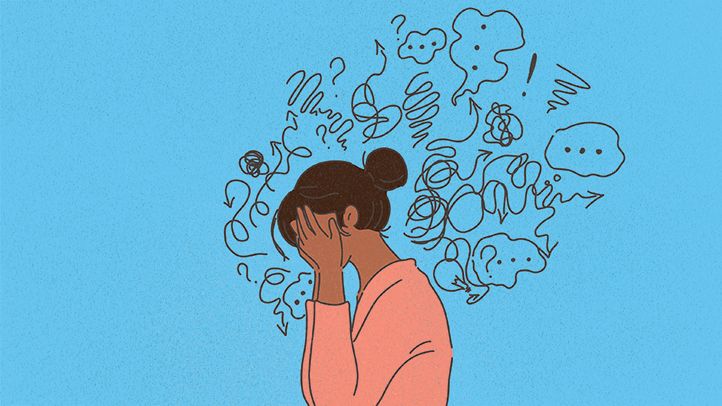Anxiety disorders are the most common form of mental illness in the United States. It is estimated that around 18 percent of American adults suffer from anxiety disorders. If you are one of them, then you know how crippling and disabling these conditions can be. In this blog post, we will discuss 10 different ways to crippling anxiety treatment options. We will also provide a few more tips on how to manage your condition effectively.
Contents
What Is Crippling Anxiety?
 Crippling anxiety is an intense and often disabling form of anxiety. It can be so severe that it interferes with a person’s ability to perform everyday tasks, such as going to work or school, socializing, or even simply leaving the house.
Crippling anxiety is an intense and often disabling form of anxiety. It can be so severe that it interferes with a person’s ability to perform everyday tasks, such as going to work or school, socializing, or even simply leaving the house.
People who experience crippling anxiety may feel constantly on edge and easily overwhelmed by everyday activities. They may also experience a wide range of physical and psychological symptoms, such as a racing heart, sweaty palms, difficulty breathing, or an overwhelming feeling of dread. Other common symptoms include:
- panic attacks
- insomnia
- extreme fatigue
- worries that are difficult to control
- frequent avoidance of social situations
Crippling anxiety can be caused by a variety of factors, such as genetics, environmental conditions, and medical conditions. It is also often linked to other mental health disorders, including depression, PTSD, phobias, and OCD. Regardless of the cause, crippling anxiety can be treated with different therapeutic approaches that may include counseling and medication.
What Are Some Crippling Anxiety Treatment options?
There are different forms of treatment that are effective in treating anxiety, but they all have their own benefits and drawbacks. The following are the top 10 approaches that are helpful in crippling anxiety treatment:
Psychoeducation
One of the first steps to taking care of your mental health is learning about the nature of anxiety and how it affects you. Psychoeducation helps people understand their condition better. As well as give them hope that they can get control of their emotions. For example, it will help people to know that their anxieties are normal and should not be feared.
In fact, many people have found that learning more about the nature of anxiety has helped them to cope better. Because when you are aware of how your emotions work and why you have them, it can make it easier to manage them.
Cognitive-Behavioral Therapy (CBT)
CBT is a form of talk therapy that focuses on helping patients identify and change negative beliefs and behaviors, as well as examining the reactions to anxieties and how best to manage them. It can help to provide a better understanding of the condition. As well as develop better coping strategies.
For example, a therapist specializing in CBT might help you break down your anxious thoughts into more manageable chunks. Then, they will work with you to develop new ways of thinking and responding.
Mindfulness-Based Strategies
 Mindfulness-based strategies involve focusing on being aware of and accepting one’s current feelings, thoughts, and physical sensations. This can help with anxiety by allowing people to step away from anxious thought patterns and take a more compassionate and accepting approach toward themselves.
Mindfulness-based strategies involve focusing on being aware of and accepting one’s current feelings, thoughts, and physical sensations. This can help with anxiety by allowing people to step away from anxious thought patterns and take a more compassionate and accepting approach toward themselves.
One study has found that mindfulness-based strategies are effective in reducing anxiety symptoms. It is thought that this is because it helps people to become more aware of their own emotional state, which can lead to better-coping strategies.
Meditation
Meditation is a great way to clear the mind, relax, and focus on the present moment. It can help teach people how to control their thoughts and reactions to anxious feelings. This in turn can lead to an overall decrease in anxiety symptoms. To begin with, it is important to find a type of meditation that works best for you.
There are many different types of meditations, including guided meditations, breathwork meditations, and mindful meditations. Each one can have a different effect on anxiety symptoms. So it is important to experiment until you find one that works best for you.
Exposure Therapy
Exposure therapy helps people confront their fears in a safe and controlled environment. It is done by exposing an individual to the source of their anxiety little by little. So they can learn how to cope with it better. In fact, ERP is consistently ranked as one of the most effective treatments for crippling anxiety.
The goal of exposure therapy is to help people build up a tolerance to the fear or anxiety-causing situation. So they can learn to cope better with it in the future.
Relaxation Techniques
Now, there are some utmost relaxation techniques that can help reduce the symptoms of crippling anxiety. Relaxation techniques such as deep breathing, progressive muscle relaxation, and yoga are all effective in reducing stress, improving concentration, and reducing symptoms of anxiety.
These techniques can help people become more relaxed and better able to cope with stressful or anxious situations. For example, when you feel anxious, taking some deep breaths may help to calm you down. Or when you are feeling overwhelmed or stressed, practicing progressive muscle relaxation can help you relax your body and mind.
Support Network
Having a strong and reliable support network is an important part of managing mental health, especially when it comes to anxiety. Surrounding yourself with people who understand and can support you is key to managing anxiety.
Your support network might include family, friends, healthcare providers, or even online support groups. Having a group of people who are there to listen and provide comfort can make a world of difference when it comes to managing anxiety.
Art Therapy
Many people find that art therapy can be a great way to manage anxiety and stress. Art therapy is based on the idea that creating art can help people express their emotions in a healthy way. It can also help people gain insight into their own thoughts and feelings.
Art therapy is often used to help people process difficult emotions and work through issues such as anxiety. It provides an outlet where people can express themselves without having to use words. You can simply use art to express how you are feeling and gain better insight into your own emotions.
Acupuncture
Acupuncture is an ancient Chinese practice that works by targeting certain points on the body. It is believed that stimulating these points can help to improve overall health and well-being. Research has found that acupuncture can be effective in reducing anxiety symptoms.
Acupuncture works by stimulating the body’s nervous system and releasing endorphins, which are the body’s natural painkillers. This can help to reduce stress and anxiety levels, leading to an improved state of mind.
Essential Oils
Finally, when it comes to crippling anxiety treatment, you must not forget about essential oils. Essential oils are made from plants and have been used for thousands of years to help improve physical and mental health. These oils work by stimulating the senses and can help promote relaxation.
There are many essential oils that are believed to be effective in reducing anxiety symptoms such as lavender, chamomile, and bergamot. Try diffusing these essential oils in your home or adding a few drops to your bath to help reduce stress and anxiety.
So, there you have it! These are just a few of the many strategies crippling anxiety treatment. With the right crippling anxiety treatment by your side, you can find relief from this debilitating disorder. Remember to always talk to your healthcare provider before trying any of these strategies!
Is There Medication For Crippling Anxiety?
When it comes to treating crippling anxiety, medication can be an effective solution. Medication is designed to help regulate the chemicals in your brain that drive feelings of fear, worry, and dread. These medications are generally prescribed when lifestyle changes and talk therapy don’t provide enough relief from symptoms.
The most common types of medications used to treat crippling anxiety are selective serotonin reuptake inhibitors (SSRIs) and benzodiazepines. SSRIs are antidepressants that help balance dopamine and serotonin levels in the brain to reduce feelings of anxiety. While benzodiazepines work quickly to reduce anxiety and panic, they are usually only prescribed for short-term relief.
Does Severe Anxiety Ever Go Away?
The answer to this question depends on the individual and their level of anxiety. For some people, their anxiety may never go away completely. However, with the right treatment and lifestyle changes, many people find that they can manage their anxiety levels over time.
In addition, here are a few tips that can help you get most of your crippling anxiety treatment:
- Make sure to get enough rest and exercise, as they can help to reduce stress levels
- Take time to relax each day and practice stress-reducing activities like yoga and meditation
- Speak to a counselor or therapist about developing strategies for managing your anxiety
- Limit your exposure to stressful situations and maintain a healthy lifestyle
- Be patient with yourself and recognize that recovery takes time and effort
- Don’t be afraid to seek support from family and friends
- Seek out help from an anxiety specialist if needed
By following these steps, many people may find that their anxiety decreases over time and that they can lead a more normal life. However, it is important to remember that each person’s experience with anxiety will be different. So the best thing to do is talk to your doctor or therapist in order to identify the best treatment options for you.
Overall, while severe anxiety can be incredibly difficult to live with, it is important to remember that there are lots of treatments available that can help you manage your symptoms. With the right help and support, you can find ways to cope and eventually start living a life without anxiety.
Conclusion
In conclusion, crippling anxiety treatment is becoming more accessible and easier to use than ever before. It is important to understand the causes of anxiety since they vary widely from person to person. Developing coping methods such as relaxation techniques and cognitive-behavioral therapy can help people manage their symptoms in a healthier way.
Additionally, medications may also be prescribed for those who are unable to adequately manage their anxiety through the above methods. It is important to discuss any potential treatments with a medical professional and weigh the pros and cons before beginning any kind of treatment plan.
For more information, please contact MantraCare. Anxiety is a feeling of fear, worry, and unease often related to an upcoming event or uncertain outcome. If you have any queries regarding Online Anxiety Counseling experienced therapists at MantraCare can help: Book a trial Anxiety therapy session


